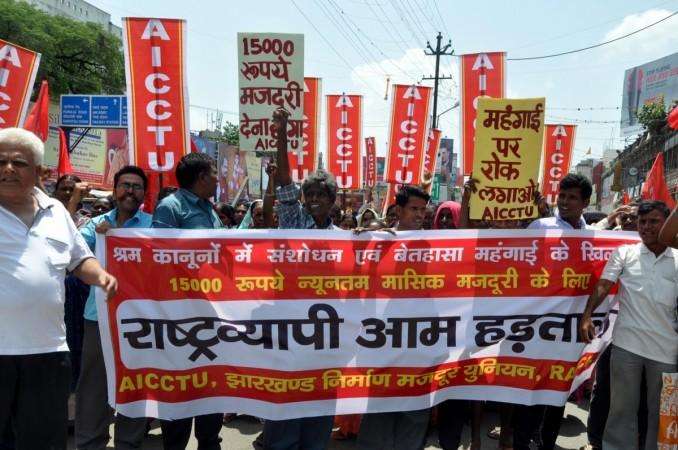
Many regions in the nation are almost at a standstill on Friday as trade unions across the country went on a nation-wide strike. The central and local trade unions associated with the Central Trade Union (CTU) in factories, banks, government offices, telecom and other sectors are participating in the strike.
The unions have claimed that almost 18 crore workers are participating in the strike to protest against the Central Government's 'unilateral labour reforms and anti-worker policies'.
Here's all you need to know about the country-wide strike:
Why is the strike happening?
The All India Trade Unions Congress (AITUC) and Centre of Indian Trade Unions (CITU) have called for the strike to protest against the "anti-people, anti-national and anti-worker" policies of the NDA government at the Centre. The trade unions across the country are of the opinion that the current government is indifferent to the demands of the workers and is implementing unfavourable changes in the labour laws.
What are the trade unions' demands?
The trade union associations across the country are demanding a higher minimum wage than what the 7th pay commission offers. The CTUs had submitted a 12-point charter of demands, which included a monthly minimum wage of Rs. 18,000, controlling of price rise and assured minimum monthly pension of Rs. 3,000.
"This time strike will be bigger than last year as over 18 crore workers from formal and informal sectors would come on streets to protest against government's indifference to their 12-points charter of demands and unilateral anti-worker labour law amendments," SP Tiwari, the General Secretary of Trade Union Coordination Committee (TUCC), told PTI.
What has the government done to assuage the unions?
In an attempt to avert the nation-wide strike of the trade unions, an emergency meeting was held between Prime Minister Narendra Modi, Finance Minister Arun Jaitley, Power Minister Piyush Goyal and Labour Minister Bandaru Dattatreya. After the meeting, Jaitley on Tuesday announced that the minimum wage of the workers will be increased along with an additional bonus. However, the trade unions did not seem impressed and continued with the scheduled strike.
How is the strike affecting common people?
Public transport has been severely affected in many regions in the country, as several auto rickshaw unions in cities like Bengaluru, Delhi and Hyderabad have decided to stay off the roads on Friday.
Bangalore: Normal life has been majorly affected in Bengaluru. No public transport, including bus services, taxis and auto rickshaws, is plying in the city. Most colleges and schools in Bengaluru urban district have been closed as a precautionary measure.
Delhi: Most schools and educational institutions in the national capital have remained opened despite fewer buses and auto rickshaws on the roads.
Mumbai: Mumbai has remained unaffected due to the strike as the Indian Railways has refused to participate in the strike. The suburban trains, autorickshaws, taxis and city buses are operating normally without causing much disruptions for the city's commuters.











![Raha turns 2: Alia Bhatt -Ranbir Kapoor host jungle themed birthday party for daughter, Kareena Kapoor, Rani Mukerji, Pooja Bhatt, Karan Johar attend [Pics]](https://data1.ibtimes.co.in/en/full/805705/raha-turns-2-alia-bhatt-ranbir-kapoor-host-jungle-themed-birthday-party-daughter-kareena.jpg?w=220&h=138)
!['If I am upset, anxious, I confide in someone': Shreyas Talpade talks about mental health awareness and depression [Exclusive]](https://data1.ibtimes.co.in/en/full/805704/if-i-am-upset-anxious-i-confide-someone-shreyas-talpade-talks-about-mental-health-awareness.jpg?w=220&h=138)



